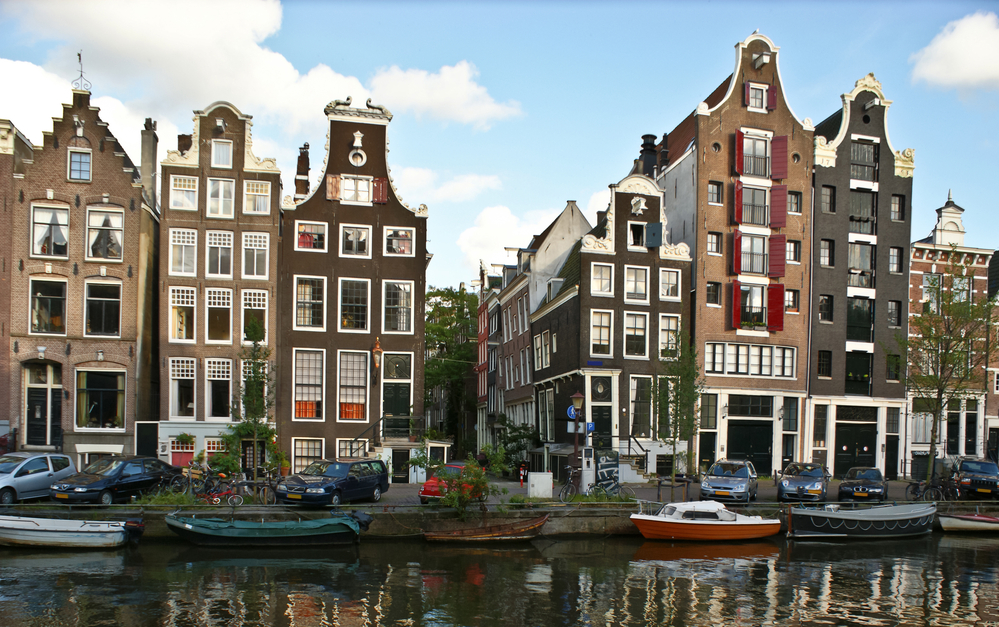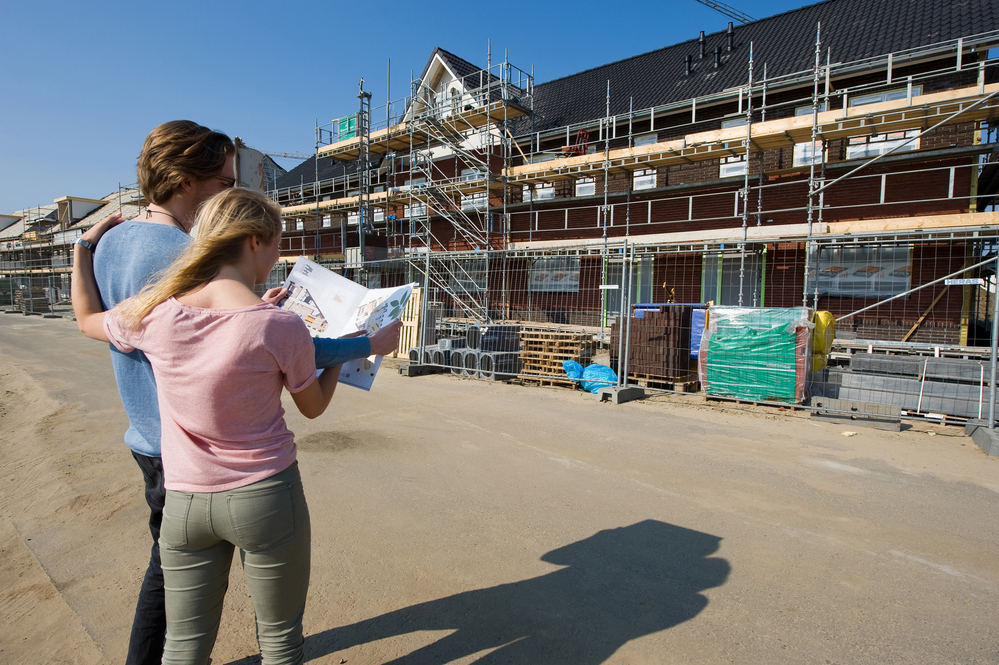So you’ve decided you want to buy a home in the Netherlands, great! Now, which will it be? A characteristic old house? Or a snazzy new build?
Before you make your decision, there are a few key differences in the buying process that are worth noting. 👇
We’re no housing experts, so we decided to speak to one. Before working as an advisor at Expat Mortgages, Fred van Maanen worked as a mortgage advisor to realtors selling new-build developments, making him the perfect man to discuss new builds with!
🙋♀️ The negotiations
Let’s start from the beginning, shall we? Usually, when your eyes settle on a pre-existing house and you decide this is the home for you, you have to get your boxing gloves — and finances — ready and enter the bidding ring.
Hopeful buyers engage in a bidding battle that can result in a significantly higher selling price. This means that you never quite know whether you can actually afford the house until you’ve thrown a few punches. 👊

However, when it comes to new-build homes, one advantage is that in most cases, there is no bidding stage or negotiations. Instead, the selling price of the property is fixed — so there’s no need to worry that you will be outbid by someone else.
READ MORE | Your borrowing power for a Dutch mortgage in 2022
However, this doesn’t mean that you’re guaranteed to score the house, Fred explains. Even if you do have the funds to buy a new build, you must still play a game of chance.
“Most new-build developments are in high demand. In order to determine who should have a chance to buy a home, hopeful buyers are entered into a lottery system.” Only those who are pulled from the figurative — or literal — hat will have a chance to place an offer on a house.
💶 The costs
We asked Fred the burning question: which is cheaper? An existing home or a new build? However, as he explains, the answer isn’t simple.

Short term costs
When you opt for an existing home, you’ll find that there are certain short term costs to cover, such as: transfer tax, the mortgage deed, evaluation report etc. With a new build home, you don’t have to worry about paying these.
This is because when you buy a new build in the Netherlands, you buy it vrij op naam (free by name). This means that the seller takes on the costs of transferring ownership to you, such as the transfer tax and the deed of transfer.
However, if you opt for a new build, you may have increased costs while building. “Since it will take a while before you can move into the new property, you will have to continue to pay for your current accommodation,” Fred tells us.
And this can be expensive — especially if you aren’t eligible for a bridging loan.
What is a bridging loan? Fred explains: “In the Netherlands, it is possible to apply for a loan to cover additional costs while you are moving into a new property. The bridging loan is determined based on the market price of your current property with a safety margin (varies per mortgage bank), minus any current debts.”
Confused? Fred offers us an example: “If you have a current property with a market value of €500,000, and a 10% safety margin, this equals €450,000 in a potential bridging loan. If you have €100,000 in outstanding debt, you will receive a bridging loan of €350,000.”
READ MORE | The biggest changes when buying a house in the Netherlands in 2022
But what if you’re renting and don’t have a property to sell? Well, tough luck. No bridging loan for you, it’s up to you to cover the double costs.
Really, no bridging loan possible? Well, if allowed with your income you can take out additional finance up to a maximum of 4% of the total investment to pay for the double costs like the interest for your new mortgage during building development time.
Long term costs
However, the advantages of a new build are often seen in the long term costs, Fred explains. This is because there likely won’t be many!
Firstly, new build properties in the Netherlands are often built with the latest energy requirements in mind. “With a high energy rating, you not only spend less money on monthly energy payments, but you can even benefit from lower mortgage interest rates.”
Whereas with an existing property, the energy rating is often lower due to the fact that it’s an older model. Of course, the energy rating of an older house can be raised by carrying out regular maintenance and refurbishments — a costly process.
READ MORE | Sustainability, remodelling, and your mortgage in the Netherlands
Perhaps you will sell your home in the future. In this case, it also benefits you to have a new build as the energy label may score you a higher selling price!
🤺 Your protection as a buyer
Another key difference between buying a pre-existing home versus a new build is the level of protection that you have as a buyer, Fred points out.

When it comes to pre-existing homes, in the heat of a hefty bidding process, buyers will sacrifice certain privileges in the hopes of winning over the sellers. For example, they may offer to drop certain resolutive conditions, ultimately making them more vulnerable.
Resolutive conditions can be important. In order to make the bid more attractive for the selling party some buyers drop the financial dissolving clause. If the mortgage is rejected after the three day reflection period you have to pay a 10% penalty (10% of the purchase price that is). Or for example they drop the condition to have a structural survey carried out.
READ MORE | 8 steps to getting a mortgage and buying a house in the Netherlands for expats
However, you are more protected as a buyer when you opt for a new build. “With a new build, you don’t need to give up certain conditions as a buyer to appeal to the seller,” Fred explains. “In most cases, you have two months from signing the contract to arrange for the costs, set up your mortgage, etcetera.”
This doesn’t stop hopeful newbuild owners from taking risks with their protection though, “I have seen that this condition is sometimes taken out in order to enhance your chances of winning the lottery, but this is an exception.”
Good to know: while the process of making an offer on a pre-existing home is certainly a bit more hectic, it’s worth noting that in the Netherlands, you have a three-day reflection period to reconsider your offer. You are free to change your mind and take back your bid within this period.
🏠 The process of setting up your mortgage
There are many aspects of setting up a mortgage that remain the same regardless of whether or not you’re buying a pre-existing home or a new build. However, there are some key differences to note.

Bouwdepot
With a new build, when establishing your mortgage, you’re also going to have to set up a construction deposit, called a bouwdepot. This is not necessary with an existing home unless you want to renovate.
The release of money
With an existing home, your money is released to the seller once the purchase agreement is signed. With a new build, it’s slightly different, money is gradually released by the bank to the contractor.
Koop-aannemingsovereenkomst
When you decide to buy a new build, you’re going to have to sign something called a Koop-aannemingsovereenkomst.
This is an agreement between you and the contractor which includes that you will buy the land on which the property will be built.
Mortgage terms
When you take out a mortgage for a new build, it’s important that you find a long-term mortgage offer that will remain valid while you wait for the development to begin. This is not necessary with a pre-existing home as you know that you will be moving in quickly.
🌎 The suitability for internationals in the Netherlands
While there are certainly advantages to buying a new build, Fred explains that there is one definite disadvantage — especially for internationals.

This comes down to the simple fact that, unlike with a pre-existing home, buyers do not know when exactly they will be able to move into a new build. This is because a number of things need to happen before the building can start.
For example, enough people need to be interested in the development and the contractors need to apply for a building permit. On top of this, there can be delays during the process of building — for example, perhaps the contractors go bankrupt.
READ MORE | After buying a house in the Netherlands — the ultimate aftersale guide for expats
As Fred points out, this is less than ideal for international home-seekers. “Most internationals will not buy new build because they need a house immediately. Instead, they often opt for a short-term rental and then buy a property.”
“There is uncertainty about when buyers of a new build will actually receive the keys,” he explains. “They don’t want to wait for months or even up to three years unless there is one house in a development project that is ready to go. A new build only works for internationals if they decide to stay in the Netherlands long term.”
Ok, you know what you want — now what? Have you made a decision and are ready to find yourself a mortgage? Or perhaps you’re still uncertain about which type of house suits your situation best? You can reach out to Fred and the rest of his team at Expat Mortgages for everything you need to know about getting a mortgage in the Netherlands.
Which would you choose: an old house or a new build? Tell us your thoughts in the comments below!